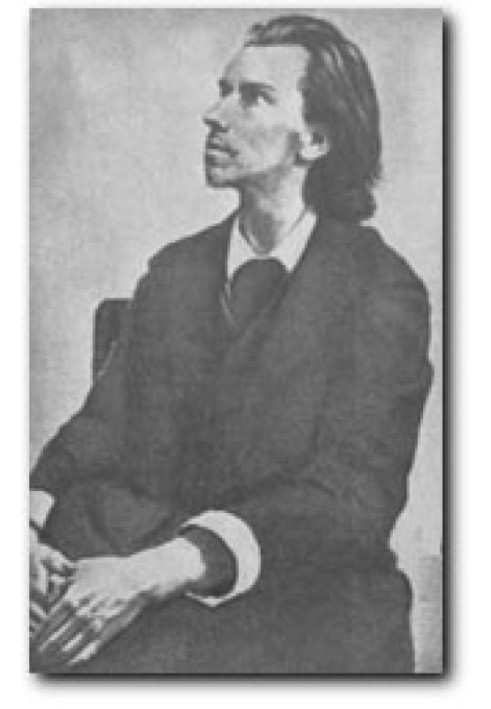Poems and poems
 Instant download
Instant download
after payment (24/7)
 Wide range of formats
Wide range of formats
(for all gadgets)
 Full book
Full book
(including for Apple and Android)
The father of Konstantin Mikhailovich Fofanov and his nine brothers and sisters was a St. Petersburg merchant of average income, who later went bankrupt and went into mystical experiences. The future poet completed his studies until the fourth grade and made up for the shortcomings of his education with constant reading, sometimes disorderly, but extremely varied. He began writing poetry early, working either in Nekrasov’s style or in the “biblical” one (this bizarre combination of everyday themes and sublime intonations is a characteristic feature of his poetics). The first poem he published, “The Vessel of the Healing Water of the Jordan...” (1881), was also “biblical,” although later the Holy Synod saw a “pagan meaning” in Fofanov’s “religious” verses, and the Observer magazine, which published one of them, was closed in 1888 for six months. By 1885, Fofanov had secured for himself a semblance of financial independence through his professional literary activities and left his father’s house, where his literary studies were not understood. However, he had not yet gained poetic fame, because no one then could compete with the favorite of the reading public, S. Ya. Nadson. His first book, “Poems” (1887), went almost unnoticed, and it did not receive the Pushkin Prize, for which Ya was nominated. P. Polonsky. But suddenly the situation changed dramatically: in 1887, very young, Nadson died, and it was precisely the tonality of Fofanov’s poetry - the poetry of a man disappointed with life, but who had not completely lost faith in existence - that was perceived as a worthy echo of Nadson’s melody (especially since Nadson managed to support Fofanov’s debut in print, when would "pass the lyre"). In addition, against the backdrop of the topical “revolutionary-democratic” poetry that was increasingly destroying the traditional culture of Russian verse, Fofanov’s work, in classical tones, seemed to the strictest connoisseurs to be a romantic outlet (although there was always a place for social motives in it). About Fofanov from his second period (“ Poems", 1889) and especially the third ("Shadows and Secrets", 1892) books are favorably reviewed by everyone - from the leaders of the older and middle generations (Ya. P. Polonsky, L. N. Tolstoy, A. P. Chekhov) to Russian symbolists "first call" (especially V. Ya. Bryusov). The symbolists never renounced the influence exerted on them by Fofanov’s two-world lyrics. His attitude towards them was much more complicated. After all, it was with the release of the first collections of Symbolist poetry in 1895 his literary influence began to decline, the era of the gap that Fofanova demanded was over. An attempt to master the artistic language of Young Symbolism (“dramatic fantasy” “At the Pole”, the poem “Look for new paths!..”, which opened the collection “Illusions”, 1900) failed. In irritation, Fofanov writes a poem “To the Decadents” (“Away, barbarians!”), and the words harshly pronounced by Blok years later (“Yes, we are Scythians, yes, we are Asians...”) sound like a belated response to this accusation. Feeling that the poetic soil is disappearing from under his feet, the poet is trying to create “relevant” poems. Their themes: famine, the excommunication of L.N. Tolstoy from the church... At the same time, Fofanov’s life went downhill. Having managed to cope with the first serious attack of mental illness in 1890, he gradually loses his strong-willed qualities, becomes poor, drinks, moves from place to place; in 1908, he unsuccessfully tried to sell a collection of his works in fifteen volumes for fifteen thousand rubles... Contemporaries who met him during these years testify: all that remained of the former Fofanov was the childlike pure look of his transparent blue eyes... In 1911, the poet became seriously ill. Using funds collected from the St. Petersburg editorial offices, he was transported to the capital, where he died at the age of forty-nine. A. Arkhangelsk
Data sheet
- Name of the Author
- Константин Фофанов Михайлович
- Language
- Russian













